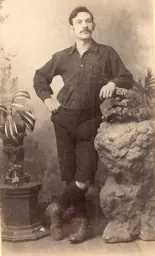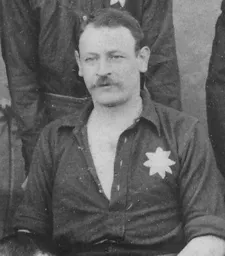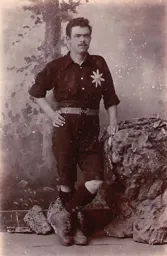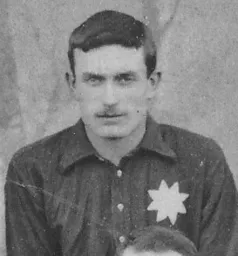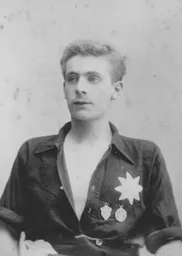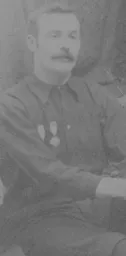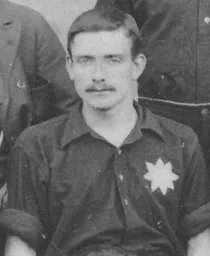The Luton Reporter -
“LUTON AND THE ENGLISH CUP
On Saturday last the ties in the third round of the English Cup competition were decided, and by far the most interesting of them as far as this locality was concerned was the encounter between Luton Town and the Polytechnic. Both teams had done well in the earlier stages, for while Luton beat the Old Etonians in the second round, their adversaries had extinguished the chances of the Swifts. The prospects of the game had been freely speculated upon, and the general opinion seemed to be that Luton ought to win if they maintained their recent admirable form. Efforts had been made to induce the Polytechnic, who had obtained choice of grounds, to journey to Luton, but they overtures were refused and the “reds” accordingly had to travel to Merton Hall, Wimbledon. The team set out on the 10.43 train on the Midland Railway and were accompanied by a good number of admirers, and excursions on both lines were freely patronised. On reaching the scene of the encounter it became apparent that the odds were against the Lutonians. They are used to playing on a hard, dry ground, and at Wimbledon they were sent upon a field which was in an extremely bad state, almost ankle deep in mud. There were no goal-nets, and the touch line was so badly defended that the ropes which were used to keep back the onlookers were frequently found to be over the line. There was not by any means a large attendance, the most of those present hailing from Luton, and the weather was of a dull and dispiriting nature.
After some delay, occasioned by the late arrival of the referee (Mr. Wilson), the teams ranged up in the following order:- Polytechnic: Goal, H. Hooper; backs, T. Wilkinson and G.A. Parker; half-backs, G.W. Turk, C.H. Cruikshank and W. Potter; forwards, H. Boswara and J. Burton (right), E.J. Beach (centre), Frank Hastings and H. Barker (left). Luton Town: Goal, J. Burley; backs A. Sanders and J. Hoy; half-backs, J. Wright, J.W. Julian and A.H. Taylor; forwards, W. Brown and F.K. Whitby, F. Whitby (centre), J. Watkins and W. Chesher (left). Julian won the toss and Beach kicked off a quarter of an hour after the advertised time. The homesters went off with a great rush, and considering the heavy state of the ground play during the early portion of the match was very fast. A foul against Taylor about 20 yards from goal threatened danger to the Luton fortress, but the ball was headed over the line, and the “Polys.” as they are termed by their followers, similarly disposed of the leather a minute later. Some pretty style was exhibited by the Londoners’ left wing, and the Lutonians, who had been shaping far from well, put in some good work, and from a splendid shot at goal a “corner” was obtained. This was ineffectual, and although the visitors obtained several minor advantages and attacked their opponents’ fortress very strenuously they were unable to beat Hooper. Some excellent efforts by Taylor and Chesher were followed by a “corner” for Luton, and Watkins shot over the bar. Burton and Beach distinguished themselves for their side, but they could not get near Burley’s citadel, the latter being given off-side on one occasion when he seemed certain to score. The “reds” made a very determined attack, and attempts were made by Watkins and Brown to get the leather between the posts, the scrimmage finishing up by the first named again shooting over the cross-bar. Sanders had been showing splendid style, and Whitby was somewhat better than usual. For a time the game was of a give and take character, but the visitors seemed to be the stronger team, and they experienced very hard luck on several occasions. Hoy relieved very finely when Beach had got through, and the Polytechnic left wing men were subsequently forced to kick over the Luton goal-line. Brown forced a “corner” for his side, but a chance of scoring was absolutely thrown away on the right wing. Some grand play by Julian enabled the Luton men to make another attack, but Parker came to the rescue and transferred the scene of operations to the middle of the field. Shortly afterwards a great misfortune happened to the Lutonians through a mistake by Wright. The latter had kicked the ball to Sanders, who had apparently a better chance of getting it clear away, but he did not kick it far enough and Boswara at once pounced upon it. A fine run up the line was finished up by a great centre to Beach, who promptly sent the ball between the uprights and thus registered the first point in the game for the Polytechnic. This success was enthusiastically cheered by the supporters of the home side, and the onlookers from Luton looked correspondingly glum. The Town representatives did not allow the reverse to distract from their efforts. They kept up a fierce attack and shot after shot was sent in, Chesher and Brown missing by the merest trifle. In less than five minutes Julian centred well, and Watkins equalised with a screw shot during the scrimmage which ensued. During the next few minutes the visitors had by far the best of matters, and though the homesters got away at times they were very hotly pressed. Watkins again sent the leather skimming over the bar instead of through, and after fouls had been awarded against either side, Burley was afforded an opportunity of acquitting himself satisfactorily, which he did. After a hot scrimmage in front of the Town goal the London men again obtained the lead, Boswara being responsible for the notch. The ball thereafter went through the Luton posts after a free-kick for “hands,” but as nobody had touched it except the player who took the kick no score was allowed. Despite several plucky attempts the straw-plaiters were prevented from equalising before half-time, and when the referee’s whistle announced that the first portion of the game had been completed the score stood as follows: Polytechnic, two; Luton, one. Early in the second period Taylor evoked loud applause by making several splendid kicks in rapid succession and his successful tackling was the means of enabling his side to force a “corner.” Give and take play was the order for the next few minutes, and then after some fine play by Hoy, Watkins was afforded a further opportunity of scoring. This was, however, not taken advantage of. Luton redoubled their exertions, and Julian, Taylor, and Hoy were particularly conspicuous. Time after time they experienced the most pronounced hard luck, and it was not until the game had been in progress for nearly half an hour that an alteration in the score was effected. From a pass from the opposite wing F. Whitby scored in good style amid tremendous cheering from the Luton section of the spectators. Following up this success the “reds” obtained a “corner,” and subsequently strained every nerve to secure the advantage. Shot after shot was sent in, only to be disposed of by Hooper in the most wonderful manner, and despite their most determined onslaughts the visitors were unable to add to their total. Burley relieved when things looked dangerous for his side, and then Brown kicked the ball right across the mouth of the Polytechnic goal. The same player made a very bad miss when Julian had sent in a fine attempt, and it was only this execrably bad shooting that prevented the Town men from obtaining the lead. When only a few minutes remained in which to play the Polytechnic left wing obtained possession and Boswara finished up well by centreing to to Beach. That player shot and Burley failing to dispose of the ball properly Burton had no difficulty in scoring. Just on the call of time Hastings put on another goal, and thus the Polytechnic won by four goals to two. It only remains to offer some remarks on the defeat. In the first place it must be distinctly averred that the winners were not by any means the better team, nor did they have at all the best of the game. Time after time the Lutonians penned them in and it was only the poor shooting powers of the forwards that prevented the “reds” total being very much larger. The homesters broke through the visitor’s defence on very few occasions, and so weak was the resistance that Burley offered that they scored whenever the forwards had got past the backs. It was generally agreed that the display of the Luton keeper was the worst form shown on their ground. Taylor was, perhaps, the hardest working member of the losing team. Julian was scarcely so much in evidence as usual, and Wright was a trifle off colour after making his mistake. Allen was seen to advantage in the centre, but the right wing pair were scarcely a success. Chesher was very capable on the left, but Watkins missed several easy chances. For the winners the forwards were very conspicuous, while Parker and the goalkeeper showed best style amongst the others. When the game had concluded a protest was lodged with the referee on the ground that the goal-posts were too high, and it was found on a measurement being made that they were 3 1/2 inches too long. This, however, was not proceeded with, and consequently it did not come before the Association at their meeting on Wednesday. The linesmen were: Messrs Sid Pakes (Luton) and F. Nicholls.”


